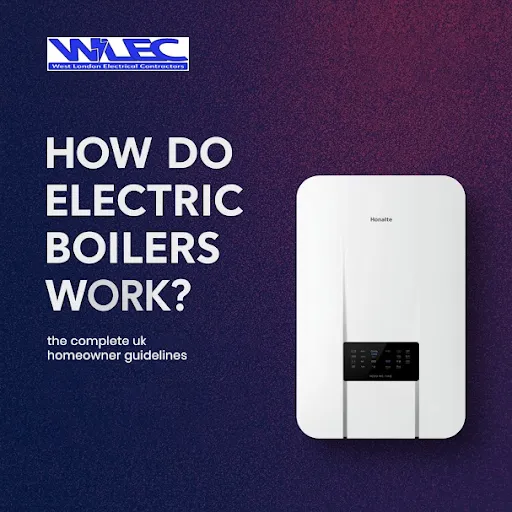
- August 11, 2025
How Do Electric Boilers Work? The Complete UK Homeowner’s Guide
Electric boilers offer a clean and efficient option for heating. They produce no emissions when in use. But how do electric boilers work? They turn electricity into heat with almost 100% efficiency. This process removes the fuel losses found in gas or oil systems. Electrical current passes through heating elements (immersion heaters) within a water-filled chamber. These elements block electrical flow. So, they create a lot of heat, which warms the water around them. This hot water circulates for central heating radiators and underfloor systems.
It is also stored for taps. Key components include the heating elements, control unit, circulation pump, and safety devices. Rising adoption in the UK comes from decarbonization goals. It’s also due to easy installation since there’s no need for a gas line or flue. Safety and quiet operation are important factors, too.
The Core Principle: Electric Resistance Heating
At the heart of how electric boilers work lies electric resistance heating. An electrical current flows through a heating element, like copper, nickel, or steel. This resistance creates heat. This process is similar to an electric kettle but scaled up for whole-home heating.
Key Stages:
- Cold water enters the boiler unit from your main source.
- Electric heating elements (immersion rods) heat the water as it flows past them.
- Heated water is pumped through radiators, underfloor pipes, or stored in a hot water cylinder.
- Smart controls regulate temperature and flow rate.
Unlike gas boilers, no combustion occurs, meaning no flue, carbon monoxide risk, or fuel storage is needed.
Key Components of an Electric Boiler
Understanding how electric boilers work requires knowing their critical parts:
- Heating Elements:
- The central “engine” transforms electricity into heat.
- High-quality copper elements heat faster and last longer.
- Heat Exchanger:
- The heat exchanger transfers heat from the elements to water with minimal loss.
- Stainless steel construction prevents corrosion.
- Circulation Pump:
- The circulation pump transports hot water throughout your heating system.
- Variable-speed pumps adjust flow for efficiency.
- Control System:
- Thermostats, timers, and smart sensors optimize temperature.
- Modulating controls adjust power based on demand.
- Safety Devices:
- Overheat cut-offs, pressure relief valves, and surge protectors.
How Do Electric Boilers Work with Different Heating Systems?
Electric boiler installation integrates with existing setups:
- Radiators work in the same way as gas boilers, with hot water circulating through pipes.
- Underfloor Heating: Ideal due to lower water temperatures needed.
- Hot Water Cylinders: For combi alternatives, heats stored water on demand.
Efficiency & Performance: Why Electric Boilers Shine
How do electric boilers work so efficiently?
- Near 100% Efficiency: Almost all electricity is converted to heat (vs. 90-95% for gas).
- Zero Wasted Energy: No heat lost via flue gases.
Precise Zonal Control: Smart thermostats heat only needed areas.
Electric Boiler Installation: Key Considerations
Before opting for electric boiler installation, note:
- Electrical Supply:
- Electric boilers need either 230V single-phase power (up to 15kW) or 400V three-phase power for higher kW.
- Older UK homes may need fuse box upgrades.
- Power Rating:
- Small flat: 4-6kW | 3-bed home: 9-15kW | Large house: 15-36kW.
- Space & Ventilation:
- Wall-mounted units fit in cupboards (no flue needed!).
- Water Pressure:
- The unit requires a mains pressure of >1.5 bar for optimal flow.
Maintenance & Longevity
How do electric boilers work over time? With minimal upkeep:
- There are no annual gas safety checks, only electrical inspections every 5 years.
- Hard water areas require descaling every 2-3 years.
- Replace the element after 8-12 years.
- Lifespan: 15-20 years (vs. 10-15 for gas boilers).
Pros & Cons: Is an Electric Boiler Right for You?
Advantages
- Zero emissions at point of use
- Silent operation
- Compact size
- Eligible for UK renewable grants
Limitations
- Higher running costs (unless paired with solar/wind)
- Power outage vulnerability
- Not ideal for large, poorly insulated homes
Final Words on How Electric Boilers Work?
Understanding how electric boilers work reveals their simplicity and efficiency. The UK aims for net zero. Such simplicity makes them a great choice for new buildings, off-grid homes, or eco-retrofits. They work best when powered by renewable energy. Talk to a qualified and certified electrician like WLEC for electric boiler installation in London. We can check if your home is a good fit and help you save money
FAQs: How Do Electric Boilers Work
Q: How do electric boilers work during a power cut?
A: They shut off instantly. Consider a battery backup if outages are frequent.
Q: Can electric boilers provide instant hot water?
A: Yes! Combi-style models heat water on demand.
Q: Are electric boilers safe?
A: They are very safe. There are no gas leaks, carbon monoxide emissions, or flammable fuel.
